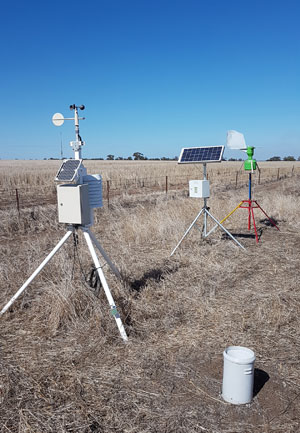Key points
- Disease monitoring and diagnostic services have provided decision-making support for South Australian growers
- Spore traps have demonstrated the conditions that lead to increased disease risk for pulses
- Monitoring of changes to disease pathotypes has informed disease management advice
Growers are increasingly taking advantage of disease diagnostic services for making timely decisions about preventive fungicide applications in pulses, cereals and oilseeds.
In South Australia, this service, which includes up-to-date information on disease threats and pathotype changes, is provided through GRDC investment in the South Australian Research and Development Institute (SARDI).
This involves deploying spore traps. In 2018 and 2019, traps set up at eight sites across SA captured the airborne spores of 13 pathogens, including Ascochyta blight of chickpeas, lentils and field peas, Botrytis diseases of pulses (chocolate spot and Botrytis grey mould) and Sclerotinia. No spores of chickpea Ascochyta blight were detected, confirming that this disease is primarily seed and stubble-borne.

Spore trap and associated automatic weather station at Bordertown in 2018. Photo: Jamus Stonor, SARDI
Botrytis grey mould spores were regularly detected, demonstrating that this disease is entirely dependent on weather conditions and is favoured by high humidity and temperatures above 10°C. Growers need to apply fungicide sprays to susceptible crops under these conditions.
Sclerotinia stem rot was detected when the average air temperature was below 10°C and the relative humidity was 70 to 100 per cent, or it was raining. Further research is investigating the potential of predicting spore showers to further help growers with fungicide decisions.
Correct disease identification is vital to ensure appropriate disease management strategies and efficacious fungicides. In 2018 and 2019, the SARDI diagnostics service analysed 292 pulse crop samples, detecting Ascochyta blight, Stemphylium blight, Botrytis diseases, Sclerotinia and a range of root diseases.
Another 165 samples were forwarded to Agriculture Victoria in Horsham for virus testing, detecting a low level of turnip yellows virus (previously reported as beet western yellows virus), pea seed-borne mosaic virus and cucumber mosaic virus. These viruses are readily detected in pulse crops and can rapidly escalate in seasons with high aphid populations. Pea seed-borne mosaic virus and cucumber mosaic virus are seed-borne and growers are advised to regularly test seed lots to ensure infection levels are kept below the recommended 0.5 per cent.
Pathogenicity changes
The project monitored pathotype changes to help growers, advisers and breeding programs to improve crop type, variety and fungicide selection.
The majority of Ascochyta fabae isolates were the widespread Pathotype 2, able to cause significant lesions on Farah, PBA Zahra and PBA Rana faba beans. This information meant that disease management recommendations for these varieties were updated to include foliar fungicide sprays for Ascochyta blight. For the first time, a possible third pathotype, aggressive on PBA Samira, is emerging and appropriate isolates have been included in the resistance breeding program at the University of Adelaide. Continued monitoring will be critical to confirm this shift.
Isolates of A. lentis that can infect PBA Hurricane XT lentils are regularly monitored through separate GRDC investment. This research has shown they are likely to spread through the environment. Stubble from lentil crops sprayed with fungicide to control Ascochyta blight still remains a source of infection for the following year’s crops and growers should rotate and isolate similar crops from last year’s stubble to prevent disease being carried over.
More information: Dr Jenny Davidson, 08 8429 2228, jenny.davidson@sa.gov.au

























































